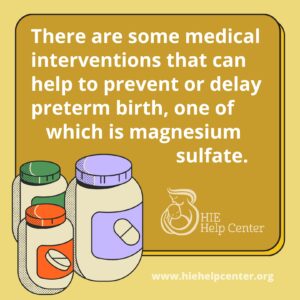 Magnesium sulfate, an inorganic salt, can help to reduce the risk of preterm birth-associated brain damage in two important ways.
Magnesium sulfate, an inorganic salt, can help to reduce the risk of preterm birth-associated brain damage in two important ways.
First, antenatal magnesium sulfate can be used to suppress premature labor and delay preterm birth. This gives medical professionals time to administer antenatal steroids that can help to reduce the risk of birth injuries (2).
Second, magnesium sulfate can provide direct neuroprotective effects to the baby’s brain. A systematic review suggested that this drug can play an important role in the prevention of cerebral palsy (3). Research also indicates that it can lower the risk of periventricular leukomalacia (PVL) (4) and intraventricular hemorrhage (5).
How does magnesium sulfate protect a baby’s brain?
Exactly how magnesium sulfate provides neuroprotection of the fetus is not well understood, but professionals hypothesize that in-utero administration of magnesium sulfate may (6):
- Stabilize blood pressure and normalize cerebral blood flow
- Stabilize neuronal membranes and block excitatory neurotransmitters
- Protect against oxidative injury
- Protect against inflammatory injury
When and how should magnesium sulfate be administered?
Magnesium sulfate should be offered to a pregnant person who is (6):
- Carrying a viable fetus and
- Very likely to deliver a premature baby within the next 24 hours
This may include patients with:
- Preterm premature rupture of membranes (PPROM)
- Preterm labor without membrane rupture and
- A planned preterm birth for medical reasons
Researchers Simhan and Himes recommend limiting the use of magnesium sulfate to pregnancies that are between 24 and 32 weeks’ gestation, although they note that more research may reveal benefits in fetuses closer to term (6).
Is magnesium sulfate safe for pregnant women and babies?
 While magnesium sulfate administration is known to be safe in most pregnant women (provided that the medication is carefully dosed and the patient’s well-being is closely monitored), it should not be given under certain circumstances.
While magnesium sulfate administration is known to be safe in most pregnant women (provided that the medication is carefully dosed and the patient’s well-being is closely monitored), it should not be given under certain circumstances.
Women who have one or more of the following conditions may experience dangerous side effects if they receive magnesium sulfate (2, 4):
- Myasthenia gravis
- Muscular dystrophy
- Myocardial compromise
- Cardiac conduction defects
- Impaired renal (kidney) function
A recent systematic review and meta-analysis suggests that the use of magnesium sulfate is generally safe for infants. Overall, they found no clear negative effects of antenatal exposure to magnesium sulfate.
When should I contact an attorney?
Babies that are born prematurely have fragile brains and are at greater risk of sustaining birth injuries. If your child sustained a preventable birth injury – this is medical negligence. If you suspect your child’s birth injury was due tp medical negligence, contact us to learn more about pursuing a case. Our birth injury attorneys provide free consultations, during which we will inform you of your legal options and answer any questions you have. You pay nothing throughout the entire legal process unless we win your case!
Related reading:
Sources:
- ABC Law Centers. (n.d.). Retrieved May 31, 2024, from https://www.abclawcenters.com/practice-areas/prenatal-birth-injuries/premature-birth-and-prevention/.
- Healthline (2015). Retrieved December 31, 2024, from https://www.healthline.com/health/pregnancy/preterm-labor-magnesium-sulfate#how-it-works
- Crowther, C. A., Middleton, P. F., Voysey, M., Askie, L., Duley, L., Pryde, P. G., … & AMICABLE Group. (2017). Assessing the neuroprotective benefits for babies of antenatal magnesium sulphate: An individual participant data meta-analysis. PLoS medicine, 14(10), e1002398.
- FineSmith, R. B., Roche, K., Yellin, P. B., Walsh, K. K., Shen, C., Zeglis, M., … & Fish, I. (1997). Effect of magnesium sulfate on the development of cystic periventricular leukomalacia in preterm infants. American journal of perinatology, 14(05), 303-307.
- Petrova, A., & Mehta, R. (2012). Magnesium sulfate tocolysis and intraventricular hemorrhage in very preterm infants. The Indian Journal of Pediatrics, 79(1), 43-47.
- Simhan, H. & Himes, K. (2023, October 05). Retrieved May 31, 2024. Neuroprotective effects of in utero exposure to magnesium sulfate. Retrieved from https://www.uptodate.com/contents/neuroprotective-effects-of-in-utero-exposure-to-magnesium-sulfate?search=magnesium sulfate. neuroprotection&source=search_result&selectedTitle=1~150&usage_type=default&display_rank=1.
- Shepherd, E., Salam, R. A., Manhas, D., Synnes, A., Middleton, P., Makrides, M., & Crowther, C. A. (2019). Antenatal magnesium sulphate and adverse neonatal outcomes: A systematic review and meta-analysis. PLoS Medicine, 16(12).
